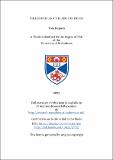Philosophy and the aim for truth
Abstract
This thesis seeks to answer the question: Does philosophy aim for truth? To address this question, I must first ask a more general question: What is it to aim for truth? My approach to answering this latter question uses pragmatism as its frame of reference by exploring the practical significance of the aim for truth. Huw Price argues that this aim provides a common purpose that helps us to engage with each other, turning our inquiry into a shared enterprise. (Price 2003) Price’s theory gives an apt description of the practical role of aiming for truth. However, I argue that this aim, conceived as such, is not advantageous to all of our inquiries. This thesis formulates a distinction between shared inquiry that aims for truth — such as scientific inquiry — and personal inquiry that lacks this aim — such as the inquiry into matters of taste. While this distinction is practical, it has many theoretical reverberations that this thesis tries to trace. It cuts across many topics of philosophical concern, such as the mechanics of disagreement, the nature of truth, objectivity, rationality, and knowledge. After dressing up the practical distinction between personal and shared inquiry in these theoretical layers, I apply it to the inquiry to which this thesis belongs. I argue against the popular belief that philosophical inquiry is scientific and thus shared. An analysis of philosophical practices shows that philosophical inquiry is personal. As a result, my thesis concludes that philosophy does not aim for truth.
Type
Thesis, PhD Doctor of Philosophy
Collections
Items in the St Andrews Research Repository are protected by copyright, with all rights reserved, unless otherwise indicated.

